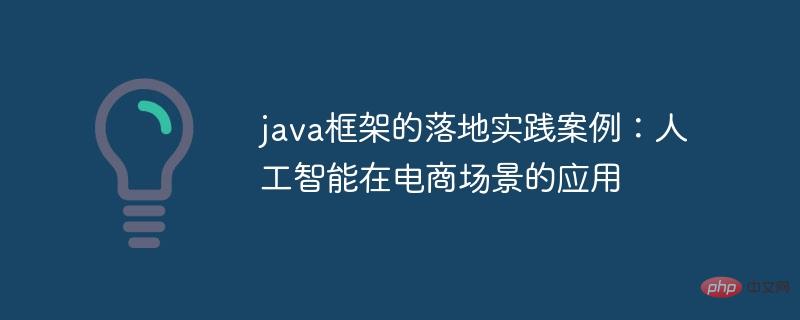 Java
Java
 javaTutorial
javaTutorial
 Practical cases of Java framework implementation: application of artificial intelligence in e-commerce scenarios
Practical cases of Java framework implementation: application of artificial intelligence in e-commerce scenarios
Practical cases of Java framework implementation: application of artificial intelligence in e-commerce scenarios
In e-commerce scenarios, Java frameworks are powerful tools for implementing artificial intelligence (AI)-driven solutions. Key Java frameworks include Spring Boot, Hibernate, and Apache Solr. Best practices include choosing the right model, collecting high-quality data, and monitoring and optimizing. Practical examples demonstrate the use of AI in personalized recommendations, inventory optimization, and fraud detection. By following best practices and learning from real-world experience, businesses can use AI to enhance customer experiences, optimize operations, and drive revenue.

The implementation practice of Java framework in applying artificial intelligence in eCommerce scenarios
Introduction
Artificial intelligence (AI) is revolutionizing the e-commerce industry. It creates new opportunities for businesses by providing personalized product recommendations, optimizing inventory management and detecting fraudulent transactions. This article will delve into how to use Java frameworks to implement AI in e-commerce scenarios.
Technology stack
The Java framework required to implement AI-driven e-commerce solutions includes:
- Spring Boot: For building microservices and RESTful APIs.
- Hibernate: Used to interact with the database.
- Apache Solr: For full-text search.
Best Practices
When deploying AI in e-commerce scenarios, it is crucial to follow best practices. These practices include:
- Choose the right model: Identify the appropriate AI model for a specific task, such as recommendation systems or fraud detection.
- Collect high-quality data: The performance of an AI model depends on the quality of the data. Ensure relevant and accurate data is collected.
- Monitoring and Optimization: Regularly monitor the performance of your AI solution and optimize as needed.
Practical Case
Case 1: Personalized Recommendation
An e-commerce company uses collaborative filtering-based AI models to provide customers with personalized product recommendations. The model predicts products that customers are likely to like based on their past purchasing and browsing history.
Case 2: Inventory Optimization
Another e-commerce company uses an AI model based on time series forecasting to optimize inventory management. The model predicts future demand for a specific product, thereby helping companies avoid inventory overhangs or shortages.
Case 3: Fraud Detection
A third e-commerce company uses an AI model based on machine learning to detect fraudulent transactions. The model analyzes transaction data, such as IP addresses and shipping addresses, to identify suspicious activity.
Conclusion
Java frameworks are powerful tools for developing and deploying AI-driven eCommerce solutions. By following best practices and learning from real-world examples, businesses can use AI to improve customer experiences, optimize operations, and increase revenue.
The above is the detailed content of Practical cases of Java framework implementation: application of artificial intelligence in e-commerce scenarios. For more information, please follow other related articles on the PHP Chinese website!

Hot AI Tools

Undresser.AI Undress
AI-powered app for creating realistic nude photos

AI Clothes Remover
Online AI tool for removing clothes from photos.

Undress AI Tool
Undress images for free

Clothoff.io
AI clothes remover

AI Hentai Generator
Generate AI Hentai for free.

Hot Article

Hot Tools

Notepad++7.3.1
Easy-to-use and free code editor

SublimeText3 Chinese version
Chinese version, very easy to use

Zend Studio 13.0.1
Powerful PHP integrated development environment

Dreamweaver CS6
Visual web development tools

SublimeText3 Mac version
God-level code editing software (SublimeText3)

Hot Topics
 Square Root in Java
Aug 30, 2024 pm 04:26 PM
Square Root in Java
Aug 30, 2024 pm 04:26 PM
Guide to Square Root in Java. Here we discuss how Square Root works in Java with example and its code implementation respectively.
 Perfect Number in Java
Aug 30, 2024 pm 04:28 PM
Perfect Number in Java
Aug 30, 2024 pm 04:28 PM
Guide to Perfect Number in Java. Here we discuss the Definition, How to check Perfect number in Java?, examples with code implementation.
 Random Number Generator in Java
Aug 30, 2024 pm 04:27 PM
Random Number Generator in Java
Aug 30, 2024 pm 04:27 PM
Guide to Random Number Generator in Java. Here we discuss Functions in Java with examples and two different Generators with ther examples.
 Weka in Java
Aug 30, 2024 pm 04:28 PM
Weka in Java
Aug 30, 2024 pm 04:28 PM
Guide to Weka in Java. Here we discuss the Introduction, how to use weka java, the type of platform, and advantages with examples.
 Armstrong Number in Java
Aug 30, 2024 pm 04:26 PM
Armstrong Number in Java
Aug 30, 2024 pm 04:26 PM
Guide to the Armstrong Number in Java. Here we discuss an introduction to Armstrong's number in java along with some of the code.
 Smith Number in Java
Aug 30, 2024 pm 04:28 PM
Smith Number in Java
Aug 30, 2024 pm 04:28 PM
Guide to Smith Number in Java. Here we discuss the Definition, How to check smith number in Java? example with code implementation.
 Java Spring Interview Questions
Aug 30, 2024 pm 04:29 PM
Java Spring Interview Questions
Aug 30, 2024 pm 04:29 PM
In this article, we have kept the most asked Java Spring Interview Questions with their detailed answers. So that you can crack the interview.
 Break or return from Java 8 stream forEach?
Feb 07, 2025 pm 12:09 PM
Break or return from Java 8 stream forEach?
Feb 07, 2025 pm 12:09 PM
Java 8 introduces the Stream API, providing a powerful and expressive way to process data collections. However, a common question when using Stream is: How to break or return from a forEach operation? Traditional loops allow for early interruption or return, but Stream's forEach method does not directly support this method. This article will explain the reasons and explore alternative methods for implementing premature termination in Stream processing systems. Further reading: Java Stream API improvements Understand Stream forEach The forEach method is a terminal operation that performs one operation on each element in the Stream. Its design intention is





